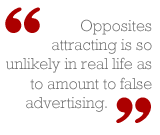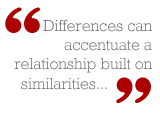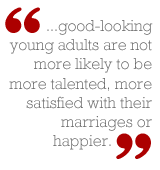









|
But Opposites Attract! -- Don't They?
Cited at least as often as the bird-flocking maxim is the dictum that "Opposites attract." Is this true? Perhaps similarity is so
familiar as to become boring. Movies regularly tell us of great romances built on what initially seemed like enmity. The hero and
heroine battle each other over some principle, words become heated, passions rise -- and suddenly they are locked in a mad, loving
embrace. "Mad" is right -- this is so unlikely in real life as to amount to false advertising.
Do opposites attract? The simple answer is "no." In human social life, opposites not only don't attract, they are unlikely even to
meet! If true opposites attracted, face it, rich people would be attracted to poor people; smart people would pursue dumb people;
great-looking people would want ugly people. But it doesn't happen that way.
There seem to be exceptions but look closely: The beautiful woman with the squat, froggy-looking millionaire three times her age. Well,
he's a millionaire! There are compensations for his disappointing looks. One well-known case of Mr. Right with Ms. Wrong is the romance
of progressive Democrat advisor James Carville and his wife, conservative Republican pundit Mary Matalin. Aren't these two
opposites? Again, look closely: They met when each managed the presidential election campaigns of adversaries Bill Clinton and
George Bush Sr. They were (and still are) political opponents -- but they were also the only two people in the world doing that particular
job. Who better to understand the challenges and motivations of their work, work that is obviously important to their self-concepts?
Research on the "opposites attract" question has suggested that it is not opposition that attracts so much as balance -- when two
people are basically similar, but their differences provide balance to the relationship, they will be that much more attracted. For
example, I'm a talker; I understand and enjoy the company of other talky people. But they don't listen to me (funny thing). My
spouse happens to be a great listener. His words are less frequent but well chosen. We're similar in background and values but our
differences provide balance and perspective. Two talkers locked together will talk past each other. Two listeners might find
themselves stuck in long silences, each waiting for the other to initiate conversation.
Some differences, then, are necessary for interaction and involvement. Differences can accentuate a relationship built on
similarities, the way spices liven up a simple, hearty entrée. Sameness without spice is bland and spices alone have no nutritional
value. Differentness -- not opposition -- can add excitement and balance to a partnership based on affection and respect.

Okay, so you've run into someone a lot lately. You've made eye contact, exchanged polite smiles, had a superficial chat or two about
the weather, good videos, the food at a favorite restaurant. Familiarity makes this person attractive to you. But what about the
person, himself or herself, furthers that attraction?
So many factors matter, in particular the similarity of your interest and backgrounds, compatible goals and communication styles.
But early on, before you have those conversations, what seems to affect so many of us is the physical attractiveness of the
other person. This finding has emerged from so much research, it is regarded as a fact in the science of close relationships. However we
define good looks, we prefer good-looking people.
Attractive = Good?
Unfair as it is to judge a book by its cover, the beauty contest starts early in life. Children quickly learn to size each other up
according to looks; they know this matters. Among adults, good looking people are preferred as friends, coworkers, dates and mates.
Research confirms a powerful physical attractiveness stereotype at work in our social judgments. We believe and predict --
wrongly, as it turns out -- that good-looking people are also good in various other ways: kindness, generosity, morality, intelligence,
talent, conversation, sex. We expect that so much of what matters to us in our interactions will be that much better with a physically
attractive person.
In fact, long-term studies show that good-looking young adults are not more likely to be more talented, more satisfied with
their marriages or happier. But they were more likely to have gotten married!
Why Do Looks Matter?
Humans and other social species invest energy, effort and time in social thinking and action. In the 21st century, however, the demands
of social orientation sometimes test the limits of human performance. Most probably, the number of interactions you have in one year exceeds the number your great-grandparents had in their entire
lifetimes! But how readily does the human mind deal with so much more social input. Our ability to psychologically process
social information has not grown since our forebears dealt with the considerably fewer interactions they had with others.
Today, we have less time than ever for so many more people in our lives. You have a few minutes to decide whether this salesman is the
one you want to buy from; perhaps only a bit longer to decide whether to exchange phone numbers with the friendly person at the party. How
do we deal with the pressure of making important decisions based on insufficient interaction? We take shortcuts -- mental
shortcuts. We read between the lines and make guesses about people.
One of the most notorious and intriguing shortcuts is the assumption that character and behavior are predicted by appearance.
An interviewer sizing up a job applicant notes the unkempt appearance, mismatched socks and sleepy expression, and concludes
that here is someone who overslept and may not be the most punctual or dedicated employee. The same process leads us to be overconfident
about how well we judge others on looks. The friendly person at the party is physically attractive -- so you trust your bias and assume
this is someone you can trust and should get to know. Perhaps unnoticed by you is the much more trustworthy, congenial, interesting
and engaging, but less instantly attractive, party guest across the room.
The bias to assume that looks predict actions can serve you by saving you time but it cannot guarantee accuracy. You may invest hope
and effort in a good-looking loser. You overlook the average-looking winner. Every hasty social judgment involves a tradeoff. We want
looks to tell us more than they can.
The Computer Dance Study
In the most famous study of how looks affect dating, researchers led by Elaine Hatfield, our
inteview guest this session, set up a Welcome Week dance for new students at the University of Minnesota. The students had completed
forms describing themselves, expecting to be computer-matched with blind dates who were just right for them. (In fact, they were
randomly assigned to dates for the evening.)
Before and during the dance, the students were rated and scored for intelligence, looks, personality traits and social skills. Once
at the dance and paired with their assigned dates, subjects were separately quizzed during "intermissions" on what they thought of
their dates and whether they wanted to see them again. Would you ask this person out again? Would you accept if he or she asked for
another date? Six months later, couples were contacted and asked whether they had in fact dated since the dance.
The Computer Dance study yielded three interesting findings:
- Before the dance, no matter what a student looked like, he or she expressed a wish for a date with the best looking partner, as
well as one with the highest possible ratings on other qualities (intelligence, social skills, etc.).
- When all was said and done, only one factor was found to be consistently linked with a desire to go out with someone again --
judging that person to be extremely physically attractive. Other qualities -- high IQ, friendliness, great social skills --
were not linked with greater or lesser liking.
- Gender didn't affect the preference for good looks -- both men and women equally valued and sought the best-looking dates.
Apparently, when fate or research puts us together, we hope for the best looking companion possible, regardless of our own
appearance. And why not? As reviewed above, inaccurate as it is, most people think beauty is more than skin deep. Not only are we naturally
attracted to physically attractive people, we think they are nicer (and sometimes nicer than they are). We also enjoy the boost in our
status being with an attractive person can give.

|



